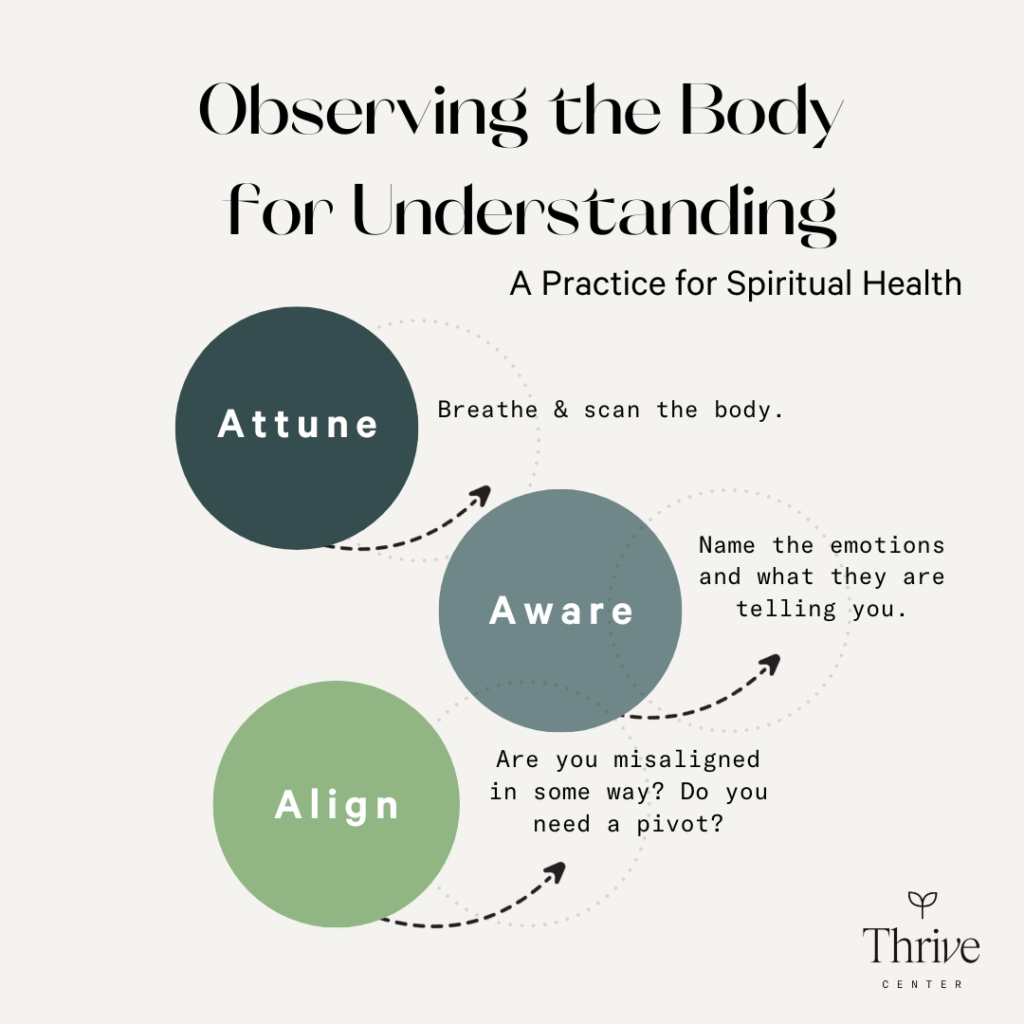A Practice for Spiritual Health
A daily practice of tuning into our bodies can help us discern meaning. We often think of spiritual practices as being “out of body” experiences, but research shows that sitting quietly and observing our breath, bodily sensations, feelings, and our thoughts – is a very useful spiritual practice. Psychologists remind us that we are “embodied”—and paying attention to our bodies, and the associated feelings that come up, is an important part of being a healthy human. Embodied practices quiet us – helping us to regulate – and they provide opportunities to gain important insights. Attending to our bodies and observing our emotions help us pause between feeling emotions and acting on them. As important as our feelings are, being able to pause and control our responses to our feelings helps our relationships and lets us live into our purposes.
1. Attune: Breathe and Scan the Body
As much as we can be frustrated with our bodies, they are an extraordinary gift and vital source of information. Attuning involves taking your body seriously and listening to signals it might be offering you. Sit comfortably in a quiet place and begin to focus on the pattern of your breath. Feel the inhale and exhale. If thoughts come into your mind, acknowledge them, and don’t worry about them for the time being. Release the thoughts and come back to your breath. You might want to inhale for a count of five, briefly pause, and then exhale for a count of 5. If you are feeling particularly anxious, extend the count of the exhale.
Scan your body for places of tension. Tune in to your feelings and bodily sensations. It’s important to be nonjudgmental with yourself when doing this. What are you feeling in your body? Do you have tension in your neck? Do you have pain? Do you feel butterflies in your stomach? Is it hard to sit still? Just name the bodily sensations, don’t evaluate them. Give yourself grace and appreciation for bearing these good and/or hard feelings.
2. Aware: Name the emotions and what they are telling you.
Now tap into your emotional landscape. What is going on with your emotions? Can you name what you are feeling? Are you feeling joy? Grief? Sadness? Pain? Delight? Impatience? Love? Dread? Try to accept what you are feeling. Again, don’t judge or evaluate. You might have lots of thoughts about these emotions, but they are just thoughts. Hold and be present to the emotions.
Now reflect and become aware of the meaning associated with your feelings and bodily sensations. What are your emotions indicating? What are they signposts to? Do you have too many things on your plate? Is that tension in your back from over-exercising, or is it because you’re upset with your spouse? Are you worried about something you said in anger to someone? Are you ruminating about something you did? What might a sense of lightness or relief say about what matters to you? Do these reflections about emotions and their meanings help you identify issues, people, or ideas that are important to you? Pay attention to how these feelings relate to your relationship with God and others, and how you feel about yourself.
3. Align: Are you misaligned in some way? Do you need a pivot?
Consider an insight from reflecting about your feelings. You might need a pen and paper, or a trusted friend to discuss the following. Does what came up when observing say anything about what you believe to be true or what you value? Do these feelings affirm that you are aligned with your deepest values and purposes? Or might they suggest that your actions or relationships are not as aligned as you might like. Perhaps you are struggling with some decision you need to make and the tension is showing up in your neck and shoulders. Acknowledge the struggle. Get as clear as you can about what your feelings are telling you? What do they say about where you find meaning? Ask yourself if your actions are aligned with what truly matters to you. Can you recognize one way your feelings affirm that you are aligned with your values? Can you identify one way you can let go of a struggle by aligning a decision or action with your deepest beliefs and sources of meaning.
Recognize that your choices and behaviors have consequences on your wellbeing. Make a plan to do one thing today to be more aligned to your values. If in doubt, choose love. Tomorrow, check in and see how it’s going…and begin again…attune…become aware, align…and activate. Print the graphic below for an easy reminder of the practice.

Click image for downloadable
Continue Exploring

Practices
Take a Breath: How Breath Work Provides a Portal to Our Spiritual Lives
Paying attention to the pattern of our breath is a spiritual practice with power to gain insight into meaning and change our lives.

Gratitude
The Power of Pausing in Gratitude
Gratitude affect happiness and wellbeing primarily through positive relationships. We finding that beliefs matters toward experiences and practices of gratitude.

Thriving
The Three Religious and Spiritual Assets of Youth Thriving
Executive director, Pamela King shares the 3 dimensions of religion and spirituality that promote positive youth development.

